Content
| | This section needs expansion. You can help by adding to it. (August 2024) |
The book chronicles how Longstreet's family made amends with the family of Ulysses S. Grant. [2]
Longstreet: The Confederate General Who Defied the South is a non-fiction book by Elizabeth R. Varon, published in 2023 by Simon & Schuster. It is about James Longstreet.
Branda Wineapple, in a book review in The New York Times , wrote that the work "is not so much about Longstreet’s character or his motivations [...] but about a symbolic Longstreet" related to the disputes about history after the American Civil War, especially how different people perceived him differently. [1]
The book has more content about Longstreet's activities after the Civil War, in the Reconstruction Era, compared to his activities during the war. [2] Varon also argued that people in the Southern United States chose to suppress the memory of Longstreet because of his postbellum pro-civil rights activism. [3]
Varon consulted writings by historians and their evaluations of Longstreet's ability in the war in order to develop her summative view. [4]
| | This section needs expansion. You can help by adding to it. (August 2024) |
The book chronicles how Longstreet's family made amends with the family of Ulysses S. Grant. [2]
Brenda Wineapple argued that the book leans "far more toward historiography than biography." [1] She praised the book's coverage of the political atmosphere of Louisiana after the United States Civil War. [1]
Peter Cozzens, in The Wall Street Journal , argued that the book should have had more focus on Longstreet during the Civil War versus his postwar activities. Cozzens also argued that Varon should have created her own analysis of Longstreet's ability in the war. According to Cozzens, the book works well with Longstreet's post-war history. [4]
Alex Beam argued that the book is "fascinating reading". [5]
Matthew E. Stanley, in The Jacobin , argued that Varon "skillfully" highlighted the "complexities" in the post-Civil War United States. [3]

The Battle of Gettysburg was a three-day battle in the American Civil War fought between Union and Confederate forces between July 1 and July 3, 1863, in and around Gettysburg, Pennsylvania. The battle, which was won by the Union, is widely considered the Civil War's turning point, ending the Confederacy's aspirations to establish an independent nation. It was the Civil War's bloodiest battle, claiming over 50,000 combined casualties over three days.
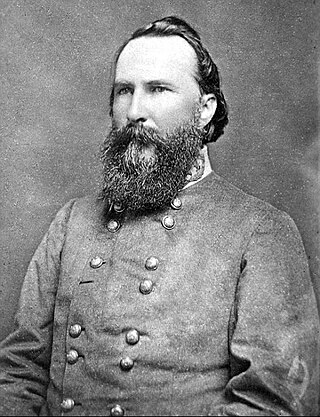
James Longstreet was a Confederate general during the American Civil War and was the principal subordinate to General Robert E. Lee, who called him his "Old War Horse". He served under Lee as a corps commander for most of the battles fought by the Army of Northern Virginia in the Eastern Theater, and briefly with Braxton Bragg in the Army of Tennessee in the Western Theater.

The Battle of Chickamauga, fought on September 18–20, 1863, between the United States Army and Confederate forces in the American Civil War, marked the end of a U.S. Army offensive, the Chickamauga Campaign, in southeastern Tennessee and northwestern Georgia. It was the first major battle of the war fought in Georgia and the most significant US defeat in the Western Theater, and it involved the second-highest number of casualties after the Battle of Gettysburg.

How Few Remain is a 1997 alternate history novel by Harry Turtledove. It is the first part of the Southern Victory saga, which depicts a world in which the Confederate States of America won the American Civil War. It is similar to his earlier novel The Guns of the South, but unlike the latter, it is a purely historical novel with no fantastical or science fiction elements. The book received the Sidewise Award for Alternate History in 1997, and was also nominated for the Nebula Award for Best Novel in 1998. It covers the Southern Victory Series period of history from 1862 and from 1881 to 1882.

The Battle of Lookout Mountain also known as the Battle Above the Clouds was fought November 24, 1863, as part of the Chattanooga Campaign of the American Civil War. Union forces under Maj. Gen. Joseph Hooker assaulted Lookout Mountain, Chattanooga, Tennessee, and defeated Confederate forces commanded by Maj. Gen. Carter L. Stevenson. Lookout Mountain was one engagement in the Chattanooga battles between Maj. Gen. Ulysses S. Grant's Military Division of the Mississippi and the Confederate Army of Tennessee, commanded by Gen. Braxton Bragg. It drove in the Confederate left flank and allowed Hooker's men to assist in the Battle of Missionary Ridge the following day, which routed Bragg's army, lifting the siege of Union forces in Chattanooga, and opening the gateway into the Deep South.

Elizabeth Van Lew was an American abolitionist, Southern Unionist, and philanthropist who recruited and acted as the primary handler an extensive spy ring for the Union Army in the Confederate capital of Richmond during the American Civil War. Many false claims continue to be made about her life. The single most reliable source is a 2002 biography by University of Virginia professor Elizabeth R. Varon.

The Killer Angels is a 1974 historical novel by Michael Shaara that was awarded the Pulitzer Prize for Fiction in 1975. The book depicts the three days of the Battle of Gettysburg during the American Civil War, and the days leading up to it: June 29, 1863, as the troops of both the Union and the Confederacy move into battle around the town of Gettysburg, Pennsylvania, and July 1, July 2, and July 3, when the battle was fought. The story is character-driven and told from the perspective of various historical figures from both the Confederacy and the Union. A film adaptation of the novel, titled Gettysburg, was released in 1993.

The Battle of Missionary Ridge, also known as the Battle of Chattanooga, was fought on November 25, 1863, as part of the Chattanooga campaign of the American Civil War. Following the Union victory in the Battle of Lookout Mountain on November 24, Union forces in the Military Division of the Mississippi under Maj. Gen. Ulysses S. Grant assaulted Missionary Ridge and defeated the Confederate Army of Tennessee, commanded by Gen. Braxton Bragg, forcing it to retreat to Georgia.
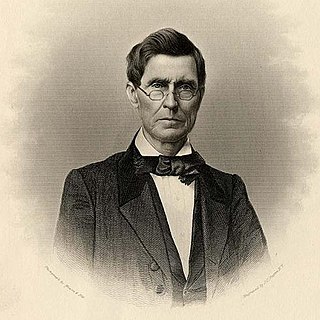
Augustus Baldwin Longstreet was an American lawyer, minister, journalist, educator, and humorist, known for his book Georgia Scenes. He held strong pro-slavery and pro-secessionist views which he publicly advocated for in his various positions. He personally owned dozens of slaves throughout his life. He held the presidency of several southern universities, including the University of Mississippi (twice), South Carolina College, and Emory College.

The Lost Cause of the Confederacy is an American pseudohistorical and historical negationist myth that claims the cause of the Confederate States during the American Civil War was just, heroic, and not centered on slavery. First enunciated in 1866, it has continued to influence racism, gender roles, and religious attitudes in the Southern United States into the 21st century. Historians have dismantled many parts of the Lost Cause mythos.
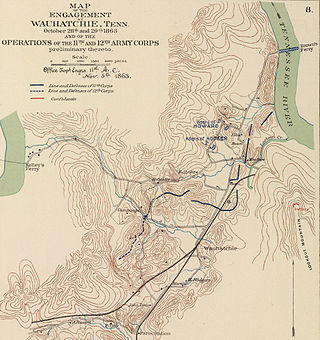
The Battle of Wauhatchie was fought October 28–29, 1863, in Hamilton and Marion counties, Tennessee, and Dade County, Georgia, in the American Civil War. A Union force had seized Brown's Ferry on the Tennessee River, opening a supply line to the Union army in Chattanooga. Confederate forces attempted to dislodge the Union force defending the ferry and again close this supply line but were defeated. Wauhatchie was one of the few night battles of the Civil War.
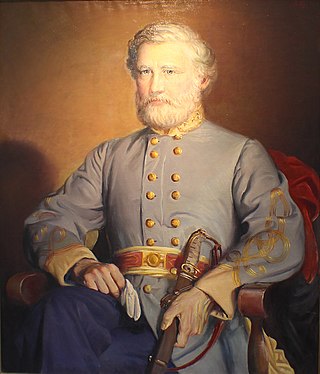
Henry Lewis Benning was a Confederate general officer during the American Civil War. He also was a lawyer, legislator, and judge on the Georgia Supreme Court. Following the Confederacy's defeat at the end of the war, he returned to his native Georgia, where he lived out the rest of his life. Fort Benning was named in his honor until 2023, when it was redesignated Fort Moore.

The Chickamauga campaign of the American Civil War was a series of battles fought in northwestern Georgia from August 21 to September 20, 1863, between the Union Army of the Cumberland and Confederate Army of Tennessee. The campaign started successfully for Union commander William S. Rosecrans, with the Union army occupying the vital city of Chattanooga and forcing the Confederates to retreat into northern Georgia. But a Confederate attack at the Battle of Chickamauga forced Rosecrans to retreat back into Chattanooga and allowed the Confederates to lay siege to the Union forces.

Helen Dortch Longstreet, known as the "Fighting Lady", was an American social advocate, librarian, and newspaper woman serving as reporter, editor, publisher, and business manager. She was the first woman who tried to secure a public office in the state of Georgia. She was the second wife of Confederate general James Longstreet. She earned her nickname from being a champion of causes such as preservation of the environment and civil rights. She is also remembered for her work as a Confederate memorialist and postmistress. In Governor William Yates Atkinson's first campaign, she rendered him valuable service by her vigorous editorials. Her fight to have women made eligible to the position of State Librarian was the first successful movement in the State of Georgia toward breaking down the prejudice against women holding high political positions. Dortch Longstreet was the proprietor and editor of two weeklies, Vice-President of the Georgia Weekly Press Association, Secretary of the Woman's Press Club of Georgia, and Assistant Librarian of the State of Georgia. She was also the leader of the movement to have the University of Georgia opened to women, was an advocate of modern industrial education, and took interest in the advancement of the women of her State and country. She died in 1962.

The Chattanooga campaign was a series of maneuvers and battles in October and November 1863, during the American Civil War. Following the defeat of Maj. Gen. William S. Rosecrans's Union Army of the Cumberland at the Battle of Chickamauga in September, the Confederate Army of Tennessee under Gen. Braxton Bragg besieged Rosecrans and his men by occupying key high terrain around Chattanooga, Tennessee. Maj. Gen. Ulysses S. Grant was given command of Union forces in the West which was now consolidated under the Division of the Mississippi. Significant reinforcements also began to arrive with him in Chattanooga from Mississippi and the Eastern Theater. On October 18, Grant removed Rosecrans from command of the Army of the Cumberland and replaced him with Major General George Henry Thomas.
The 10th Kentucky Infantry Regiment was a three-year volunteer infantry regiment that served in the U.S., or Union Army during the American Civil War.

The Battle of Liberty Place, or Battle of Canal Street, was an attempted insurrection by the Crescent City White League against the Reconstruction Era Louisiana Republican state government on September 14, 1874, in New Orleans, which was the capital of Louisiana at the time. Five thousand members of the White League, a paramilitary organization made up largely of Confederate veterans, fought against the outnumbered racially integrated New Orleans Metropolitan Police and state militia. The insurgents held the statehouse, armory, and downtown for three days, retreating before arrival of federal troops that restored the elected government. At least 32 people, including at least 21 members of the White League, were killed in the fighting. No insurgents were charged in the action.

Elizabeth R. Varon is an American historian, and Langbourne M. Williams Professor of American History at the University of Virginia.
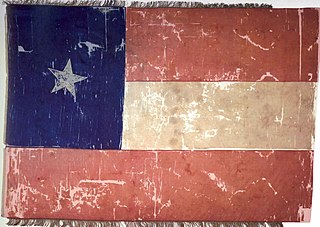
The 5th Texas Infantry Regiment was a unit of Confederate States Army infantry volunteers created in 1861 that fought in the Army of Northern Virginia during the American Civil War. The unit was part of the famous Texas Brigade. The regiment fought at Eltham's Landing, Seven Pines, Gaines's Mill, Second Bull Run, South Mountain, Antietam, and Fredericksburg in 1862. It fought at Gettysburg and Chickamauga in 1863 and the Wilderness, Spotsylvania, Cold Harbor, and the Siege of Petersburg in 1864. The regiment surrendered to Federal forces on 9 April 1865 after the Battle of Appomattox Court House.
Henry Benedict Mattingly was a Union Army soldier in the American Civil War and a recipient of the United States military's highest decoration, the Medal of Honor, for his actions at the September 1, 1864, Battle of Jonesborough, Georgia.